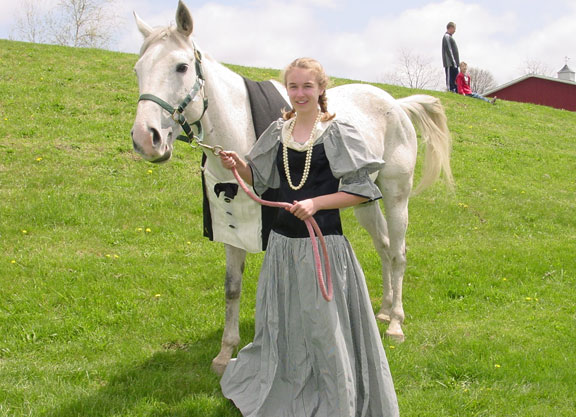By Diana Pikulski
Lucky Orphans Horse Rescue opened its gates in 2008. Founded by Deanna Mancuso, the organization transformed from an adoption oriented charity to a sanctuary model and a powerhouse of key partnerships that sets it apart from many other Thoroughbred-centered groups. Their name comes from their first retired racehorse resident, Lucky Orphan (Obligato).
Lucky Orphan is a Pennsylvania-bred who raced 74 times. He won 19 races, placed six times and finished third in 11 races. Lucky Orphan earned more than $142,000 over five years. For most of his career he raced every other week and stayed sound. He was purchased as a three-day eventing prospect but never really settled down enough to stay with it.
“He came to live with us in 2006, before we had our nonprofit status and while I was still figuring out what Lucky Orphans was going to be,” said Mancuso. “He's been with us ever since and has never been an easy horse in that he seems to look for ways to get hurt. He is our bubble-wrap horse but he is one of the sweetest souls I've come across. Lucky Orphan will stand on the cross ties forever teaching kids the anatomy of the horse and how to pick feet. I never have to worry. He is great at this.”
On making the change from adoption organization to sanctuary, Mancuso says: “People are unpredictablem, as are their situations and relationships. Horses often come back and it is usually by surprise. So, it caused problems with our budget, spacing etc. It seemed better to just keep the horses in the program and focus on keeping them at work here.”
Mancuso has created strategic partnerships with well respected and proven programs to help her service people of all ages and needs. Today, Lucky Orphans Horse Rescue is home to 13 Thoroughbreds.
People come to learn advanced horsemanship through Harmony Horsemanship, founded by Lindsey Partridge, two-time winner of the Thoroughbred Makeover, or participate in a certified EAGALA (Equine Assisted Growth and Learning Association) session.
This year, Lucky Orphans is starting a new pilot program in partnership with the county probation department using Equine Experiential Education (E3A) to help at-risk, traumatized young people change their trajectory in life.
“This is a very specific program,” said Mancuso. “The kids will be here only to participate with the horses and a certified coached to help them get past their personal trauma and circumstances. The goal is for them to create a new life plan and develop deep self-awareness from connecting with the horses.”
Lucky Orphans is accredited by the Global Federation of Animal Sanctuaries (GFAS) as well as the Thoroughbred Aftercare Alliance (TAA). Located in southern Dutchess County, the farm is well-placed for attracting with people from all economic and social backgrounds.
“The farm has great road frontage and we are basically at the gateway to the Berkshires so I made it a point to be very involved in the community,” said Mancuso. “I started by working with the local chamber, the schools and all of the local humane organizations. You have to get people to trust you and then they trust the program.”
Last week, the farm hosted 52 participants in the Omega Institutes' Trust Technique workshop. The Trust Technique is based on the theory that deepening the connection between humans and animals can transform the lives of both. It uses mindfulness and focused presence techniques as a basis for resolving problems for humans and for pets or other animals.
Mancuso's efforts have put off-track thoroughbreds front and center in local mainstream life and shown their adaptability and excellence in teaching and transforming lives. The farm is part of a local Airbnb where the guests come to the farm for a day, volunteer and participate in a connection session one on one with a horse.
The Thoroughbreds are special and because of their experiences with people and willingness to please, they connect easily and bring you to into the moment,” said Mancuso. “They force you to be in that relationship and they give you very honest feedback and deep joy and contentment. They help people feel better and they enable people to be successful in their relationships. Nothing we do is about training with ropes or chains. It is reward based training and we are showing it to kids as young as 10 years old. Our horses go to schools, hospitals, nursing homes.”
Every Saturday, kids of all ages come and learn grooming and horsemanship. The farm is also open to the public from 9 to 3 every day.
In addition to the new program for at-risk youth, Mancuso is training volunteers on how to work with traumatized horses in rescue situations.
“We work with the Red Cross, local Animal Control officers, and volunteers, to teach them how to communicate with the traumatized animals to make rescue easier and safer for everyone,” said Mancuso. “We train them to move animals and keep them safe.”
Mancuso and her team are working towards sustainable funding so that their vital programs are not interrupted by fundraising events.
“We want people to see the work we do every day and help us through consistent regular sustainable funds on which we can count,” said Mancuso. “Our motto is: People Helping Horses Heal People and it is working better than we ever imagined.”
For more information, go to: http://luckyorphanshorserescue.org/ or email Deanna Mancuso at LuckyOrphans@gmail.com.
Diana Pikulski is a partner at Yepsen & Pikulski and the editor of the Thoroughbred Adoption Network.
Not a subscriber? Click here to sign up for the daily PDF or alerts.






